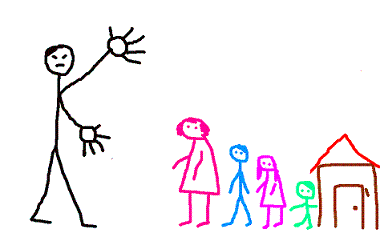
A glossary of Jewish and Hebrew terms
Navigate to other chapters of Homeless... at Home by Shlomit Weber
Homeless... at Home
Table of contents
Quotes
These
Jewish and Hebrew terms are used in this story.
Daddy. From "av" - father.
'Going
up' to live in
This
term makes no logical sense at all, but when Israelis, even Anglo Saxon
Israelis, use the term Anglo Saxon, they mean anybody from an English speaking
country. The
The
daily language of Talmudic times.
The Talmud is written in both Hebrew and Aramaic. Biblical commentaries written in that
period are written in the daily language of the people, Aramaic, rather than in
the holy language, Hebrew. As
English speakers today might write commentaries in English. Ironically, to my children, the original
Hebrew text is easier to understand than the Aramaic discussions,
explanations and translations!
A
Jew who 'returns' to being observant.
Jews do not look for converts among non-Jews, but observant Jews hope
that non-observant Jews will become more observant. This will hasten the coming of the
messiah.
A
mess. Confusion and disorder.
Circumcision.
Literally,
goat droppings. Used to indicate
something is worthless:
“It’s not worth bupkis!”
Happening
in just the most inconvenient way.
Following Murphy's Law.
'Woman
of Valor'. Proverbs 31: 10-31. An alphabetic acrostic song sung before
the blessings over the wine and bread at the Friday night meal that begins the
Sabbath.
Small
pot for making turkish coffee.
Jews
make sure not to take the name of the Lord in vain. So we write his name with a letter
missing, or added, or just say, 'Hashem' which means, "The Name"
Kindergarten. (Literally, 'garden'.)
Jewish
bill of divorcement.
A
spiritless humanoid, several of which appear in Jewish folklore.
A
name used to refer to G-d.
Literally, "The Holy One, Blessed Be He".
Jews
make sure not to take the name of the Lord in vain. So we write his name with a letter
missing, or added, or just say, 'Hashem' which means, "The Name"
Friend
or comrade.
Mommy.
The
Jewish marriage contract presented to the bride by the groom, to list and
protect her rights.
Sanctification. Usually indicating the blessing said
over wine, acknowledging the blessedness of G-d. At the meals on the Sabbath, we
ceremonially acknowledge G-d's blessedness in giving us the fruit of the vine,
and bread from the earth.
A
holiday 33 days after Passover when children stay up all night messing with
bonfires.
A
proper person. Who is respectable
because s/he has good character traits. (Yiddish)
Scroll
of parchment with the shema inscribed on it, affixed to the door post of Jewish
houses and rooms.
One
of G-d's commandments. There are
613 of them commanded in the Torah (first five books of the bible). Also used more loosely to mean any good
deed.
An
annoying person who constantly pesters.
A
variation of Hebrew typeface used by Rashi – an eleventh century Talmudic
commentator living in
The
Jewish Sabbath. From sundown Friday
to sundown Saturday. Religious Jews
don't drive, cook, turn electrical appliances on and off, write, play musical
instruments, handle money, etc.
It's a day to be with family and friends. To talk and read and sing and rest and
pray and walk in nature and reflect on the week.
Peace
at home. Harmony between husband
and wife.
G-d's
presence among us. The Shechina is
everywhere, but is felt, and rests comfortably where people are praying or
studying torah or doing good deeds.
The Shechina does not rest amidst gloom, laziness, frivolity, levity or
idle talk.
The blessing for seeing fulfillment of a
long awaited goal: "Blessed art thou, lord our g-d, king of the universe,
who has kept us alive and sustained us and brought us to this time."
The
verse, “Hear, o
“Have
a good week!” Said instead of
‘hi’ or ‘bye’ on Saturday night after Shabbat has gone
out.
The
sabbatical year. Biblical crop
rotation. Every seventh year, the
land in
Happening
for no particular reason.
Repentance. Fixing you past misdeeds.
The
ninth of the Hebrew month of Av.
The date on which both temples were destroyed. Other national calamities have occurred
on that day as well: the fall of Bar Kochba’s fortress Bethar, and the
expulsion from
Non-kosher.
'Eshet
Hayil'. Proverbs 31: 10-31. An alphabetic acrostic song sung before
the blessings over the wine and bread at the Friday night meal that begins the
Sabbath.
Of
blessed memory. Said when
mentioning a good person who has died.
------------------------------------------------
Copyright
2004 by Shlomit Weber
------------------------------------------------